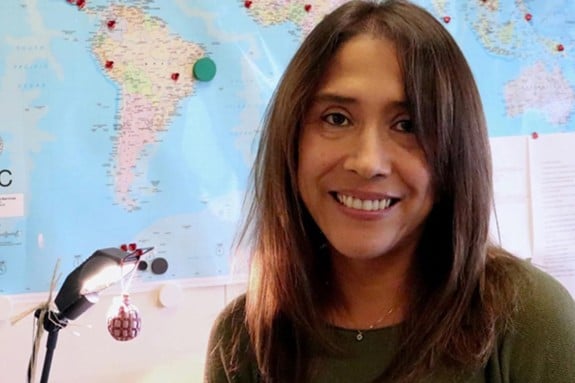“The work we do is worth every single battle”
Growing up in Colombia, Milena Osorio always knew that she wanted to work providing mental health and psychosocial support to victims of conflict. She worked with Doctor without borders in Kosovo, Sierra Leone, Darfur, Philippines among other contexts before joining the International Committee for the Red Cross (ICRC). She went on her first mission with the ICRC in Georgia, where she helped to develop programs to support the families of missing people. Since then Milena’s forward-thinking approach to mental health in contexts of violence has led her to become the current Mental Health and Psychosocial Programme Coordinator.

“I was determined to become a psychologist, because I knew it was my purpose to help people affected by violence. I have worked with a lot of who have gone through traumatic experiences, and one important thing I have learnt from working in so many different places, is that culture, personality and context makes each person react differently to trauma. I have learnt to never assume anything about how they feel. With every person I encounter, I try to look at their situation with fresh eyes and come up with tailored solutions.”
”Mental health support was not seen as a priority for the ICRC at that time”
“The aim of our programs is to increase the capacity of local communities to stabilize and improve people’s mental health and ensure the emotional well-being of individuals and communities affected by armed conflict and other situations of violence. I wanted to integrate our work into the core of ICRC activities – which was ambitious and incredibly challenging as mental health was not seen as a priority for the ICRC at the time. We had very few resources and no clear policy on increasing the ICRC’s capacity on that front, but we had conviction and drive, so we continued pushing to make our vision a reality.”
“When I came to the ICRC my dream was to build a team that could respond to the psychosocial and psychological needs caused or exacerbated by conflict. Back then we only had eight MHPSS programs. It is so rewarding and validating to now have 130 quality programs everywhere in the world and to have a fantastic team of 200 psychologists and Mental Health and Psychosocial support (MHPSS) delegates, and resident staff that are passionate and committed to their work. It makes me very proud.”
Milena and her team are also worked on a resolution and a Movement policy, involving people from the ICRC, the IFRC, Swedish Red Cross, Danish Red Cross, among many other National Societies:
“We developed a Movement resolution which we presented at the Council of Delegates 2019. This policy aims to harmonize concepts within the Movement and coordinate activities to better address needs and tackle gaps in a more efficient way. It deals with different aspects, from developing and ensuring impartial and comprehensive access to mental health and psychosocial support, to protecting the mental health and psychosocial wellbeing of staff and volunteers.”
”In order to deliver meaningful support there is a need for more professional expertise”
“When I was working in the field I came across so many people with severe cases of psychological distress who made it crystal clear to me just how important it is to provide mental health to people. In order to deliver meaningful support there is a need for more professional expertise. Every case requires an enormous amount of time, energy, empathy and dedication from our delegates. This is a profession that not only represents professional challenge but also a personal one. We cannot produce miracles, it takes time. You have to find ways to connect with someone who has experienced unspeakable horrors, and somehow help them rebuild their sense of normalcy. Last year we oversaw 300.000 people - you can imagine the toll it takes on them. We expect a lot from our delegates, but we also understand that it’s a difficult job and try to offer them as much support and guidance as possible to help them continue doing this demanding work.”
“We have a gender balanced team working at these issues, even though there are usually more female practitioners than men. We come across all kinds of people and many of them could feel more comfortable speaking to psychologists and health practitioners they can relate to. So we need to have a diverse team to understand and represent as many types of people as possible. Having a diverse team also means that we have opportunities to learn from each other, and I’ve found that being open to learning about different ways of thinking has made me a better psychologist and person. It’s critical to the success of our work that we be respectful of our colleagues and always cultivate a sense of teamwork and belief in the work that we do. I know first-hand that what we do is incredibly important, and I have no doubts whatsoever that it is worth every single battle.”
Milena Osorio
ICRC
